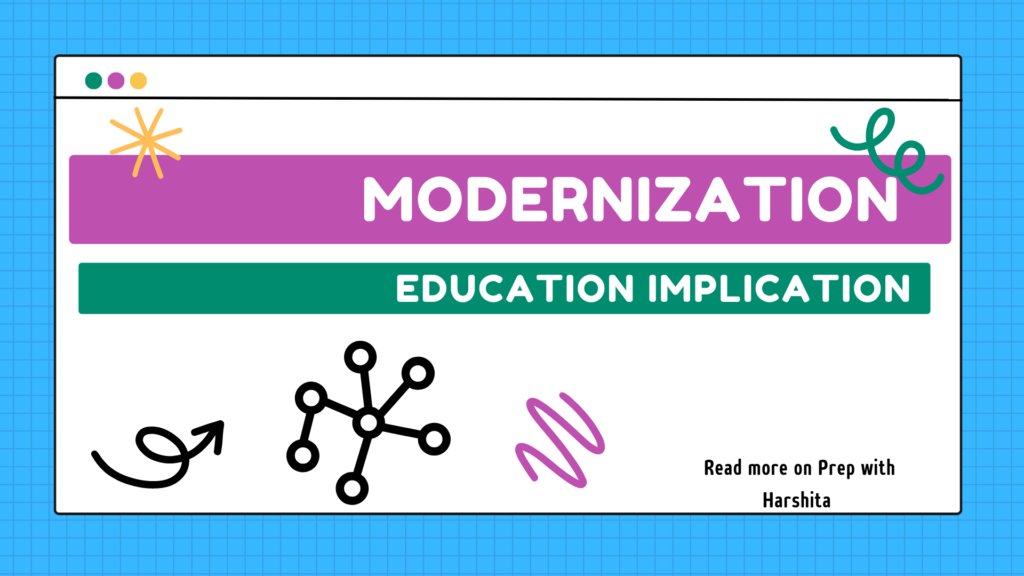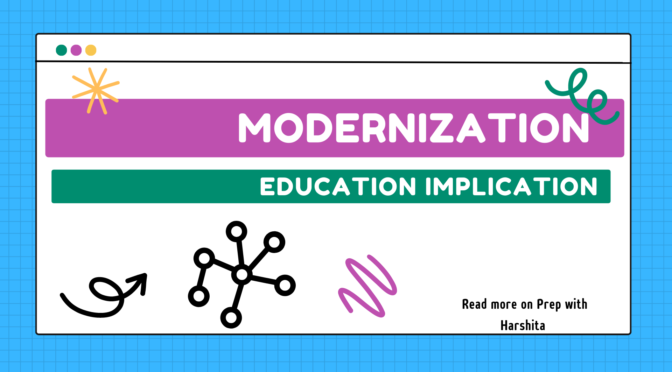Modernization of Indian society refers to the process of societal transformation driven by industrialization, urbanization, technological advancements, and the influence of global ideas and practices. This process has had significant implications for education in India.
Modernization and Education Implications:
Here are the key aspects of the modernization of Indian society and its educational implications:
- Access to Education: Modernization has led to increased emphasis on education as a means for social and economic progress. Efforts have been made to expand access to education, with the goal of achieving universal primary education and reducing educational disparities based on gender, socioeconomic status, and geographical location. Modernization has created a demand for skilled labor, leading to a greater emphasis on vocational and technical education.
- Curriculum and Pedagogy: The modernization of Indian society has influenced curriculum and pedagogy in education. There is a greater focus on scientific and technological subjects, as well as practical skills that are relevant to the demands of the modern economy. The curriculum has evolved to include subjects such as computer science, information technology, entrepreneurship, and environmental studies. Pedagogical approaches have also shifted towards student-centered and experiential learning methods to foster critical thinking, problem-solving, and creativity.
- Role of English Language: Modernization has elevated the importance of English as a global language of communication and economic opportunity. English proficiency has become a sought-after skill for employment and higher education. Consequently, there has been a growing emphasis on English language education in schools and universities, with a focus on developing proficiency in spoken and written English.
- Technological Integration: Modernization has brought about the integration of technology in education. Digital tools, e-learning platforms, and internet connectivity have revolutionized the teaching and learning process. The use of multimedia resources, online learning platforms, and virtual classrooms has expanded access to educational resources and facilitated distance learning opportunities.
- Changing Educational Goals: Modernization has led to a shift in educational goals. There is a greater emphasis on equipping students with skills and competencies required in the modern workforce, such as critical thinking, problem-solving, communication, and collaboration. Education is seen as a means to foster innovation, entrepreneurship, and adaptability in a rapidly changing global landscape.
- Social Mobility and Meritocracy: Modernization has offered avenues for social mobility based on merit and skills rather than traditional social hierarchies. Education has become a key driver of social and economic mobility, providing opportunities for individuals to transcend their socioeconomic backgrounds. The focus on meritocracy in education aims to create a more equitable society by rewarding talent and effort.
- Cultural Change and Diversity: Modernization has brought about cultural change and the emergence of a more diverse and cosmopolitan society. Education plays a crucial role in facilitating intercultural understanding, promoting tolerance, and celebrating diversity. The curriculum incorporates multicultural content, history, and perspectives to foster inclusive education that reflects the pluralistic nature of modern Indian society.
- Global Perspectives: Modernization has made the world more interconnected, leading to increased exposure to global ideas, cultures, and challenges. Education in India has responded by incorporating global perspectives in the curriculum, fostering global citizenship, and preparing students to be active participants in the globalized world. Exchange programs, international collaborations, and cross-cultural experiences are promoted to develop a broader worldview among students.
Overall, the modernization of Indian society has transformed the landscape of education, expanding access, adapting curricula, integrating technology, and emphasizing skills and competencies needed in the modern era. Education is viewed as a catalyst for individual empowerment, social progress, and economic development in the context of a rapidly changing globalized world.
Also Read: Prep with Harshita

Also Read: Cultural Determinants of Curriculum


Transforming Education in Modern India is an inspiring journey towards a brighter future. In this paradigm shift, the role of educational institutions is pivotal. Among them, the Best CBSE Schools in Haralur stand out as catalysts for innovation, providing a foundation that empowers students to thrive in the dynamic landscape of contemporary learning.
Thank You,
Mayank Jain,
CEO of ezschooling.com
Modernization in education has revolutionized learning methods, fostering creativity and critical thinking. With technology integration and innovative teaching approaches, schools in areas like BTM Layout have embraced this change. Here’s a list of the top 10 schools in BTM Layout, where modern educational implications thrive, ensuring holistic development for students.